The Irish
_________
At the present time we know very little about our ancestors from Ireland.
The names are McDonnell, Rush and Callaghan and, maybe Corcoran, Sharkey or Cuniffe.
We do know they had roots in County Roscommon.
County Roscommon is located in the Irish midlands and has a population of only 51,987 (1991 Census).
The main towns are Roscommon, Boyle, Castlerea and Ballaghaderreen.
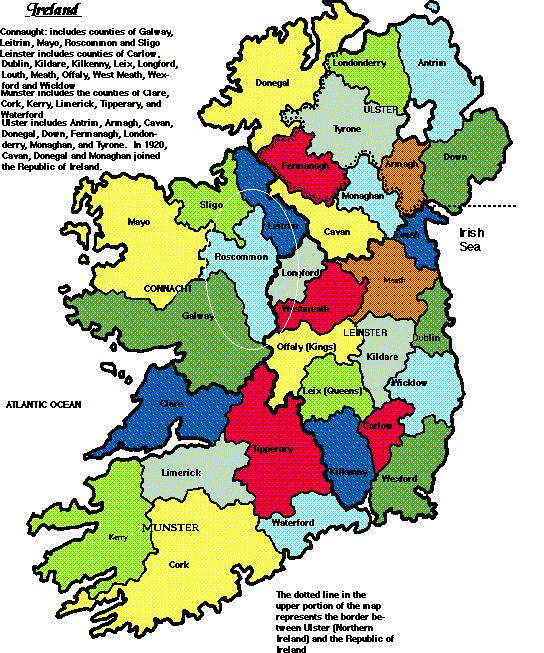


 | The Leitrim-Roscommon |  |
|---|
| Townland |
Civil Parish |
Barony |
County |
Description |
Head of household Surname |
Head of household Given |
Head of household Occupation |
Other occupants |
|---|---|---|---|---|---|---|---|---|
| Lisdrumneill | Tibohine | Frenchpark | Roscommon | Household | McDonnell | John(55) | farmer | Jane(56)-Martin(16)-Winifred(14) |
| Figh | Tibohine | Frenchpark | Roscommon | Household | McDonnell | John(25) | farmer | |
| Ballymurray | Elphin | Roscommon | Roscommon | Household | Rush | Michael(67)or(47) | shepherd | Mary(54)-Martin(23)-Katie(22)-John(20)-Winnie(19)-Michael(18)-James(17)-Mary Ellen Harlow(5) niece |
Michael McDonnell was not included in the census as he had emigrated to the United States in 1898.


1. Mary M. McDonnell was born in East Orange, New Jersey, USA.
She was daughter of John McDonnell and Mary K. Rush,
Mary married Alexander McNab at St. Joseph's Church in Newark, New Jersey, USA.
Alexander was born in Kearny, New Jersey, USA.
 Second Generation
Second Generation 
2. John McDonnellwas born on April 8, 1902 in New York City, New York, USA
He was son of Michael McDonnell and Mary Callaghan.John died on January 30, 1968 in Maplewood, New Jersy, USA.


3. Mary K. Rush was born on November 5, 1902 in Unkown, Roscommon, Ireland
and died on July 24, 1955 in Newark, Essex, New Jersey, USA.
There were four other children in her family.
Winifred born in 1904.
Ellen born September 2, 1906 and died in May 1987.
Margaret born in 1908.
Michael born in 1910.
Mary arrived at Ellis Island on November 3, 1925,
aboard the SS Caronia, with her sister, Ellen.
Ellen made the voyage under the name of her sister, Winifred.
It is believed, Winifred had a promise of employment
but decided not to take it and Ellen went in her place.
The ship's manifest indicated they were going to their aunt, Mrs Carlson, in Hackensack, NJ.
At Immigration they listed their father as Martin Rush.
At that time he was living in Batford, Fuerty, Co. Roscommon.
![]()
 Third Generation
Third Generation 
4. Michael McDonnellwas born on September 21, 1876 in Lisdrumneil, Roscommon, Ireland.
He was the son of John McDonnell and Jane Rogers.
Michael died about 1960 in Lisdrumneil, Roscommon, Ireland.
Michael's siblings Include;
Martin born in 1885 and Winifred born in 1887.
Michael arrived at Ellis Island on July 2, 1898 aboard the SS Etruria.

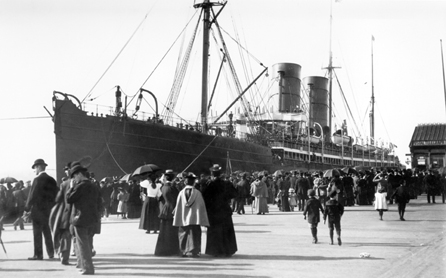
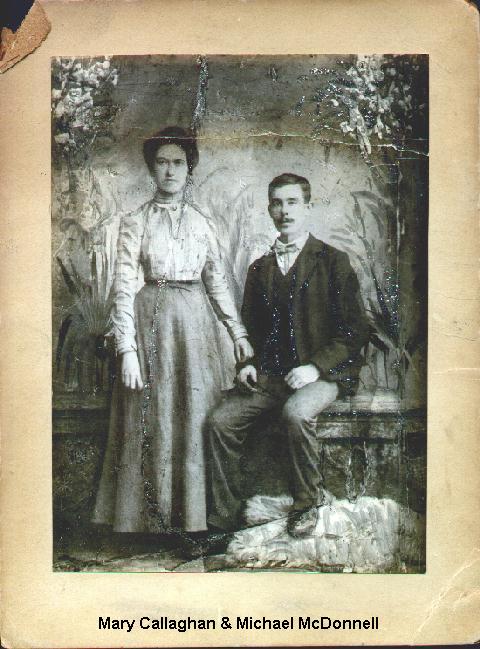
5. Mary Callaghanwas born about 1880 in Cloonfad, Roscommon, Ireland.
She was the daughter of Timothy (Thady?) Callaghan and Bridget Corcoran.
Mary died about 1912 in New York City, New York, USA.
Two of Mary's known siblings were
Ellen Callaghan born about 1885
and Kate Callaghan born about 1888
Kate arrived at Ellis Island on May 2, 1906 aboard the SS Carmania,
where she stated she was going to live with her sister Mary
at 2438 Eighth Ave., New York City.
Kate also indicated she came from Frenchpark, Roscommon.
6. Martin Rushwas born about 1878 in Ireland.
He was the son of Michael Rush and Mary Gough (Goff)
He died in Ireland
Other children in his family were;
Mary Rush born about 1874 in Ireland
Catherine Rush born about 1875 in Ireland
Tom Rush born about 1877 in Ireland
Patrick Rush born about 1879 in Ireland
Katie Rush born about 1879 in Ireland.
John Rush born about 1881 in Ireland.
Winnie Rush born about 1882 in Ireland.
Michael Rush born about 1883 in Ireland.
James Rush born about 1884 in Ireland.
7. Unknown.
She married Martin Rush about 1901.
No other information is available at this time.
![]()
 Fourth Generation
Fourth Generation 
8. John McDonnell was born about 1846 in Roscommon, Ireland
He died in Lisdrumneil, Roscommon, Ireland.
John married Jane Rogers about 1870 in Roscommon, Ireland.
He was listed in the 1901 Census as a farmer.

9. Jane Rogers was born about 1845 in Roscommon, Ireland.
She died in Lisdrumneil, Roscommon, Ireland.
10. Timothy (Thady?) Callaghanwas born about 1850 in Cloonfad, Roscommon, Ireland.
He was son of Cormack Callaghan and Mary Corcoran
Timothy died in 1892 in Cloonfad, Roscommon, Ireland.
Timothy married Bridget Corcoran on March 13, 1878 in Fairymount, Roscommon, Ireland.
11. Bridget Corcoran was born in 1857 in Cloonfad, Roscommon, Ireland.
She died in Cloonfad, Roscommon, Ireland about 1950.
12. Michael Rush was born about 1834 in Ireland.
Michael married MaryGough (Goff) about 1873 in Ireland.
13. Mary Gough (Goff) was born about 1857 in Ireland.
![]()
 Fifth Generation
Fifth Generation20. Cormack Callaghan was born about 1811 in Tibohine, Roscommon, Ireland.
He died on September 25, 1886 in Cloonfad, Roscommon, Ireland.
Cormack married Mary Corcoran on February 27, 1838 in Unknown, Ireland.
21. Mary Corcoran was born about 1818 in Unknown, Ireland.
She died about 1858 in Unknown, Ireland.
Additional information will be added as it becomes available.


The most numerous and widespread of the clans, the Clan Donald is one of the families, who, while using different surnames or different methods of writing the same surname, have an identical genealogical derivation. Of these, the families of MacDonald or McDonald, and MacDonnell or McDonnell, are the most important. The mode of writing is immaterial, the name is the same; they are of one stock.
The Clan derived its generic name from Donald, the grandson of Somerled: and hence the name MacDonald, or son of Donald, Mac, or the Gaelic Mhic, signifying son. By abbreviating the prefix to Mc and M' many families write the name McDonald and M'Donald.
The surname MacDonnell, McDonnell, McDonell, and other forms and methods of writing this name, came first into use, when Aeneas MacDonald of the Glengarry branch was, in 1660, raised to the Peerage of Scotland by the title of Lord MacDonell.

The MacDonnells of Antrim are in fact descendants of the Clan MacDonald. In the
sixteenth century Somhairle Buidhe ('Sorley Boy') MacDonnell conquered a large
part of that county and defended it tenaciously against Gaelic Irish and English
intrusions. Their stronghold was Dunluce Castle, which stands atop a rocky
promontory on the north coast, not far from The Giant's Causeway. They
abandoned it when the kitchen and several servants fell into the sea after waves had
eaten away at the cliffs below the castle. From there they moved to Glenarm on the
east coast.
Sorley Boy MacDonnell was born in 1505 at Dunanayne Castle, Ballycastle,
Co. Antrim. He was of Scottish descent but like all the people in East Ulster
and West Scotland, he would have seen the Northern Channel more as a wide
river running through the land, than as a country boundary.
The government saw the Scots back in Ireland as a political threat and
in an attempt to halt their expansion took punitive actions against them. In
1551 Sorley Boy was arrested and imprisoned in Dublin Castle. He was
released the next year, hardened by the experience, and promptly routed the
English from Carrickfergus. Seizing the Constable, Walter Floody, whom he
held for a large ransom, Sorley Boy is reputed to have said, "playnly that
Inglische men had no ryght to Yrland".
In 1559 he subjugated the Macquillans of the Route at a battle at
Bonamargy and became Lord of the Route. In 1564 however he was defeated
by the Northern Gaels in their continual attempts to totally dominate Ulster,
and Sorley Boy was seriously injured. The next year both he and his brother
James were captured by Shane O'Neill, at Ballycastle and imprisoned. While
in imprisonment James was murdered by the O'Neills. Three years later,
Shane O'Neill unbelievably sought protection among the MacDonnells after
suffering a defeat at the hands of the O'Donnells., in the continual inter gaelic
feuds. On 2nd June 1567 the MacDonnells took the opportunity to assassinate
Shane O'Neill and thus have their revenge for James.
In 1575, Essex invaded Antrim at the behest of Elizabeth I and when
Sorley Boy moved his wife and family to Rathlin Island for protection, Essex
sent Norris to invade it and murder the women and children. Essex reported
back, "Sorley then stood upon the mainland of the Glynnes and saw the
taking of the island and was likely to run mad for sorrow saying that he had
lost all he ever had". Despite this, Sorley fought back and by 1584 he was
again complete master of Antrim.
Elizabeth sent her new Lord Deputy, Sir John Perrot against him. By
1586 the English came to terms with Sorley Boy MacDonnell in his 81st year
and he lived in peace from this time until his death four years later. He died
at Dunanayne where he had been born, and is buried at Bonamargy Abbey in
Ballycastle.

SOME SCENES OF IRELAND
(As seen by Alexander & Mary McNab while visiting Ireland in 1998.)

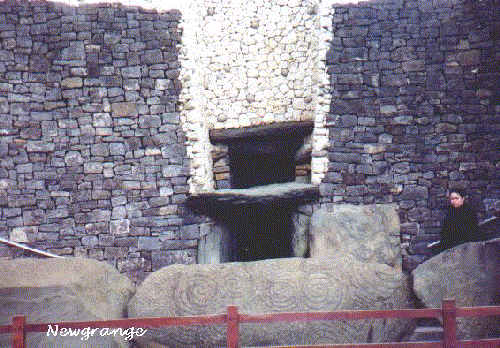
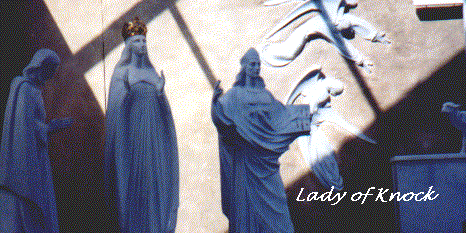
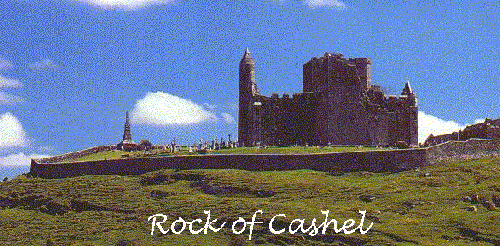
|